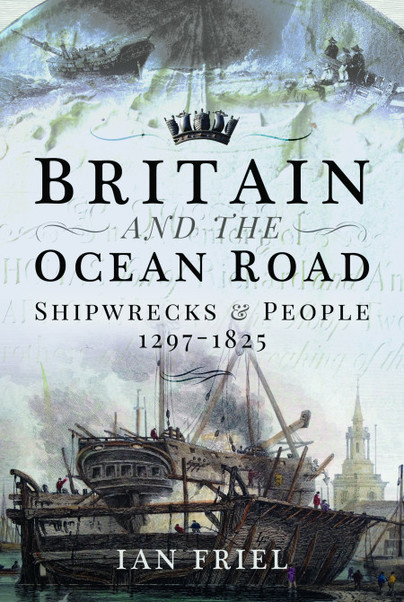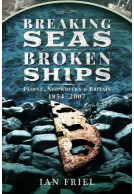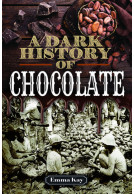Britain and the Ocean Road (ePub)
Shipwrecks and People, 1297-1825
Imprint: Pen & Sword History
File Size: 35.3 MB (.epub)
Pages: 224
ISBN: 9781526738370
Published: 30th September 2020
Award
'Short listed for the Mountbatten Maritime Literary Award, 2021'
| Other formats available - Buy the Hardback and get the eBook for £1.99! | Price |
|---|---|
| Britain and the Ocean Road Hardback Add to Basket | £25.00 |
Britain and the Ocean Road uses new firsthand research and unconventional interpretations to take a fresh look at British maritime history in the age of sail.
The human stories of eight shipwrecks serve as waypoints on the voyage, as the book explores how and why Britain became a global sea power. Each chapter has people at its heart – sailors, seafaring families, passengers, merchants, pirates, explorers, and many others. The narrative encompasses an extraordinary range of people, ships and events, such as a bloody maritime civil war in the 13th century, a 17th-century American teenager who stepped from one ship to another - and into a life of piracy, a British warship that fought at Trafalgar (on the French side), and the floating hell of a Liverpool slave-ship, sunk in the year before the slave trade was abolished.
The book is full of surprising details and scenes, including England’s rudest and crudest streetname, what it was like to be a passenger in a medieval ship (take a guess), how a fragment of the English theatre reached the Far East during Shakespeare’s lifetime, who forgave who after a deadly pirate duel, why there were fancy dress parties in the Arctic, and where you could get the best herring.
Britain and the Ocean Road is the first of two works aimed at introducing a general audience to the gripping (and at times horrifying) story of Britain, its people and the sea. The books will also interest historians and archaeologists, as they are based on original scholarship. The second book, Black Oil on the Waters, will take the story from the age of steam to the 21st century.
This is not a maritime history of Britain to 1825 nor is it really a book about shipwrecks. It is a set of 8 case studies of different ships, all of which were eventually destroyed in one way or another, from the middle ages to the early 19th century, chosen to illustrate different aspects of English maritime activity. Three of them predate the union with Scotland so they are not strictly speaking British. There is a bit about each ship and then a short essay about the merchant marine or the navy at the time,
Edward James - Historical Novels Review
Some of the ships are well known, others less so. The case studies start with a little known event, when an English invasion fleet intended for the continent turned on itself, the Cinque Ports contingent destroying the Yarmouth ships Each chapter told me something new.
"Friel’s research, some of which is original and some of which draws on other expert sources in the fields of history and archaeology, robustly supports the thesis of the work, and therefore offers significant value for interested scholars."
The Naval Historical Foundation
Read the full review here
Britain’s involvement in the Transatlantic slave trade and the historical injustices of
Current Archaeology
colonialism and the British Empire have been much in the news in recent months. In
Britain and the Ocean Road, maritime historian Ian Friel asks how Britain got caught
up in these nefarious activities.
Britain and the Ocean Road eloquently discusses the rise and solidification of Britain’s maritime supremacy from 1297 through 1825. Friel’s extensive research and accessible writing style makes this work relevant for the general public and researchers as a source for understanding Britain’s extensive maritime history with a unique approach of using shipwrecks as the starting point of the conversation.
Nautical Research Journal
All eight of the chapters present interesting and well-assembled narratives of different facets of seafaring.
Mariners Mirror
This is a very well written book which I would highly recommend to any of our readers with an interest in this subject.
Shipping – Today & Yesterday, March 2021
Telling the maritime enterprises of various ships over a time span of about 500 years may seem dispersive, but dr. Friel always manages to keep the reader's attention awake by narrating the stories of people, of their hopes in going to sea, of the desire to know new places or simply escape from poverty. The description of how naval technique changes, both in the construction of the various ships, both in the on-board equipment and in military tactics, is also quite interesting. We are faced with a beautiful book that narrates little-known episodes close to others much more known (the Battle of Trafalgar in chapter 6) and which deserves to be on the shelves of a library of maritime history enthusiasts and others.
Omne Ignotum Pro Magnifico
Read the full Italian review here
Article: ‘Exploring the drama, tragedy and history of shipwrecks’, words by Phil Hewitt
Chichester Observer, 28th January 2021
Those readers who venture within the pages of this book will find it readable and, at times, engrossing. No prior knowledge of maritime history is needed, because Friel does a commendable job entwining the necessary background information with the maritime history. Britain and the Ocean Road is perfect for anyone seeking information on English history from less common perspectives. Along the way, don’t be surprised if you discover answers to questions that you’ve not uncovered solutions to in reading other maritime texts.
Pirates and Privateers
Read the full review here
BOOK OF THE MONTH
Nautilus Telegraph, January 2021
Listed in the Spicy tales of Norfolk history feature
Norfolk magazine, January 2021
The surprising thing about Ian Friel's book is how far back into the annals of our history it travels. The Viking invaders pre-1297 also had sailing boats, of course, and the British eventually copied their design and build, but this is a comprehensive and brilliantly conceived memoir of a seafaring nation from its earliest times to when it was time to use steam power for our naval craft. Absolutely fascinating!
Books Monthly
About Dr Ian Friel
Dr Ian Friel is a maritime historian with an international reputation and wide experience of historical and archaeological work, including the 17th-century Swash Channel Wreck (which he successfully identified as the Fame of Hoorn) and studies of sunken First World War tankers for an environmental project. He worked in museums for many years, including the National Maritime Museum, Greenwich and the Mary Rose Trust, and became an independent historian, museum consultant and writer in 2007. He has broadcast on TV and radio, and most recently undertook research for an episode of BBC TV’s Who Do You Think You Are? Ian is the author of The Good Ship, The British Museum Maritime History of Britain and Ireland, Henry V’s Navy and Britain and the Ocean Road, along with many papers, reports and other publications.

















